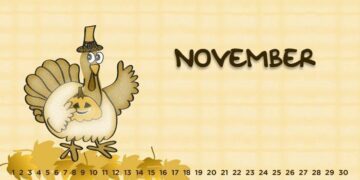Sitting square in between October and December, November is the eleventh month of the Gregorian calendar.
November is seen as a time to start finalizing any plans or projects that you had for the year.
The weather in November is starting to get a bit intense, too!
For those in the northern hemisphere, fall is coming to an end, the last leaves are falling, and it’s getting quite cold out.
November is unsurprisingly quite different for those who live in the southern hemisphere.
Temperatures are already ramping up, with the beginning of summer just around the corner.
By now, you’ve hopefully dusted off the barbecue and cleaned the pool, as they’ll be the stars of your home for the next few months!
Like every other month of the year, November has plenty to show for itself.
Let’s take a look at the origins of November, the traditions we celebrate during it, as well as some interesting little facts to bring it all together!
November’s name has remained unchanged since the ancient Roman calendar, which was in use until 45 BC. This first Roman calendar was only made up of ten months, with November being the ninth month. November actually translates rather appropriately into “ninth month” in Latin. When the Julian calendar was adopted in 45 BC, two new months were added, which pushed November back to the 11th month. Despite its change in position, November was never renamed.
On November 19, 1978, the largest group suicide in history took place in Jonestown, Guyana. The group who took their lives were instructed so by Reverend Jim Jones, who led the suicide cult called the “People’s Temple.” Over 900 of the cult members drank a cyanide-laced drink, with those who refused being forced to consume it.
November is the last of the four months, which have 30 days. The other months are September, April, and June.
Many people in the US can recall what they were doing at 12:30 pm on November 22, 1963. It was on this day that President John F. Kennedy, known as JFK, was fatally shot while riding along with his wife in a procession of cars. He was rushed to a hospital all too late and was pronounced dead at 1 pm that day. Kennedy was the fourth US president to be assassinated, after Abraham Lincoln, James Garfield, and William McKinley.
The Anglo-Saxons had quite a fitting name for November. It’s usually at this time of the year in the northern hemisphere that cold winds start to chill you to the bone, and as such, they called it “Wind Monath,” or wind month.
The Anglo-Saxons also called the month of November “Blod Monath,” or blood month. It gained this name as it’s in November that they would traditionally slaughter cows to provide food for the long winter months.
The fifth of November marks a historic day in the UK. On this day in 1605, a group of Roman Catholics plotted to blow up the English Parliament while King James I was inside. Fortunately, the plot was foiled. Every year festivities are held across the country to celebrate the group’s failure, which includes setting off countless fireworks, lighting bonfires, and even setting alight effigies of Guy Fawkes, one of the conspirators.
The US has its own historic day, too. Thanksgiving is celebrated on the fourth Thursday of November and has been celebrated since 1621. The first Thanksgiving was a feast celebrating the first bountiful harvest of the pilgrims of Plymouth and New England. It is still celebrated in a similar way, with families coming together and sharing plentiful amounts of food traditionally available during November.
The Full moon in November is traditionally called the Beaver Moon in the US. The tradition goes back to North America’s early colonial years, as it was during this time of year that hunters would set their beaver traps for the last time before the lakes and water sources they lived in froze over.
November has just one birthstone, the radiant topaz. The topaz is symbolic of many things, but most of all, it is a symbol of strength and honor. The ancient Greeks also believed that the stone had the ability to turn oneself invisible.
November has two birth flowers, the ever-stylish chrysanthemum and the peony, the epitome of class.
November 3, 1957, was a historic day for both Soviet Russia and the world. It was on this day that the first spacecraft carrying a live passenger was successfully launched into space. The passenger was Leika the dog, an unassuming-looking stray pooch who had been found on the streets of Moscow. The Soviets used stray dogs in their tests because they assumed that they would be used to the hunger and cold that they would inevitably experience in outer space.
A rather hairy spectacle occurs in various parts of the world, including Australia, the US, and England, every year in November. It’s called Movember, and the idea is to raise money for charity by growing a mustache. Participants must shave on the first morning of November and grow their mustache throughout the month, with the ensuing amusement as an incentive for others to donate to a good cause.
The beginning of the end of the War of Independence began on November 30, 1782, when a provisional treaty was signed between the newly-formed United States of America and the Kingdom of Great Britain. The final treaty wasn’t completed and signed until nearly a year later in Paris on September 3, 1783.
Like all other months of the year, a number of famous and important people have been born in November. Some of the more notable people include Mark Twain, Leonardo DiCaprio, Winston Churchill, Kurt Vonnegut, and Scarlett Johansson.
Those born in November can be born under one of two very different star signs. If you’re born before November 23rd, then you have the sign of Scorpio. Those born on November 23rd or later have the sign of Sagittarius. Scorpios are said to value trust and honesty above other things, as well as being quite intense yet imaginative people. Those born under the sign of Sagittarius are quite different, being energetic and idealistic while also generous and open-minded.
November is apparently the official month for banana pudding lovers. If you’re not a big fan of pudding, don’t worry. There are plenty of other things to celebrate this month, as November is also National Novel Writing Month (US), National Pomegranate Month (US), and National Adoption Month (US), among many others!
On November 19, 1863, President Abraham Lincoln delivered the Gettysburg Address at the consecration of the National Cemetery at the site of the Gettysburg battle. While Lincoln’s speech was just two minutes long, it summed up everything important there is about democracy. Interestingly, Lincoln was in the middle of a minor bout of smallpox while he gave the speech and looked drained and ghost-like.
If month-long celebrations aren’t really your thing, then check out National Cook For Your Pets Day on November 1st. Other fascinating days to celebrate throughout November include World Vegan Day, also on November 1st, Veterans Day on November 11th (US), National Button Day on November 16th (US), and National Cake Day on November 26th (US).
William Shakespeare apparently wasn’t all too fond of November. Hailed as one of the all-time greatest writers of English literature, Shakespeare wrote 154 sonnets and 37 plays which are still in production today. In all of the works that Shakespeare wrote, the month of November isn’t mentioned a single time.

November is a bit of an interesting month when you think about it. While it’s still the end of fall, it seems that winter has already been dragging on for a while already.
While this can be a bit of a depressing concept, it’s good to keep in mind that while winter is coming, so are the first days of snow!


















